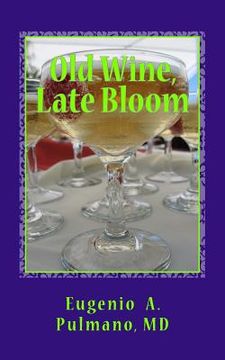Reseña del libro "Old Wine, Late Bloom (en Inglés)"
Dr. Eugene A. Pulmano finished his medical degree from University of the Philippines in 1969 and practice medicine as an internist in the State of New Jersey, until he retired recently. + + + (Excerpts) Contents: 1. The Filipino Identity and The Filipino Dream - p.6 2. UP, CBA and Cesar Virata - p.28 3. The Clash of Civilizations: My Take - p.34 4. On Manufacturing in USA - p.37 5. Power & Empowerment - p.39 6. Phil. Economic Development: Consciousness, Spirit and Vision - p.50 7. Primary Care, Philippines - p.77 8. All That Jazz - p.79 9. Beethoven Music, etc - p.102 + + + The Filipino Identity and The Filipino Dream Dateline: 2014 Last week I went to see my doctor in the Jersey City, where I used to practice, for a scheduled nerve conduction studies and electromyogram (EMG). He is a physiatrist, a doctor of medicine specializing in physical and rehabilitation medicine. I used to refer most of my patients to him, because he was/is the best in Hudson County, if not in the entire state of NJ; he would take his time doing a procedure, meticulous in evaluating patients, and his feedback report had always been a pleasure to read. Anyway, as my physiatrist was doing my NCS and EMG, we came to talk about many other things. He mentioned his missionary work in India and his touring of Asian countries but the Philippines. He wished he had visited the country, because as it turned out later, he ended up in Jersey City where many of his patients are Filipinos. Jersey City has a large population of Pinoys. He regretted the fact that he knows so little of the Filipino people and the Philippines. He knows vaguely about the Battle of Manila Bay. I had to fill in gaps in his knowledge about that battle. I had to impress on him that that famous (infamous) battle was a sham; before that battle the fate of the Philippine was already foreordained at the Treaty of Paris, at which the Philippines was ceded (sold) by the Spain to America for the sum of $ 20 M. Under the pretext of liberating us, America chose to stay and occupy us for geopolitical and trade and commercial reasons. I could have added a few more details to this historical event, but did not want him to get distracted from the procedure he was doing on me. But before we left the topic of the Philippines and Filipinos, though, he asked me a tough question, out of a sincere desire to know more about us. He asked: "Can you tell me something of the Filipino identity?" I suppose in spite of his many contacts with Filipino patients and other professionals like doctors and nurses in the health field, he probably could not put his finger on who are the Filipinos, in contradistinction with the ease with which the Chinese, Koreas, Japanese and Indians, who come more or less come from same geographic part of the world, are known. He could not have asked me a more difficult question, about which our writers, historians and intellectuals have a hard themselves to define. Caught somewhat off-guard, I groped for an answer, and fell back on Nick Joaquin's response faced with a similar question: "The Filipino identity is in the process of becoming," and gave him the barest outline of our history and culture in almost a power point-presentation from the time the ten datus from the Malay-Indonesian region arrived in our shores, to and through the Spanish regime, to the American interlude including the Commonwealth period, WW II and the Japanese occupation, to the granting of our independence in 1946, post WWII the reconstruction period and more recent history, e.g. waves of immigration to the US and other parts of the world. For sure this was a sprint through our history and culture. I don't know if my friend made any sense out of it, got a better idea of what and who we are. (More inside the book)

